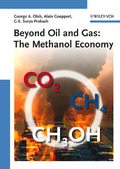Beyond Oil and Gas: The Methanol Economy

1. Auflage Februar 2006
XIV, 290 Seiten, Hardcover
110 Abbildungen
16 Tabellen
Sachbuch
Kurzbeschreibung
In this masterpiece, the famous Nobel laureate discusses the use of methanol as a viable alternative to dangerous and dwindling energy resources. Olah weighs the pros and cons of our current main and alternate energy sources, while providing ways to overcome particular obstacles.
Jetzt kaufen
Preis: 27,90 €
Preis inkl. MwSt, zzgl. Versand
Euro-Preise für Wiley-VCH- und Ernst & Sohn-Titel sind nur für Deutschland gültig. In EU-Ländern gilt die lokale Mehrwertsteuer. Portokosten werden berechnet.
- Gedruckte Ausgabe vergriffen -
In this masterpiece, the renowned chemistry Nobel Laureate, George A. Olah and his colleagues discuss in a clear and readily accessible manner the use of methanol as a viable alternative to our diminishing fossil fuel resources. They look at the pros and cons of our current main energy sources, namely oil and natural gas, and varied renewable energies, and new ways to overcome obstacles.
Following an introduction, Olah, Goeppert and Prakash look at the interrelation of fuels and energy, and at the extent of our non-renewable fossil fuel resources. Despite the diminishing reserve and global warming, the authors point out the continuing need for hydrocarbons and their products. They also discuss the envisioned hydrogen economy and its significant shortcomings. The main section then focuses on the methanol economy, including the conversion carbon dioxide from industrial exhausts (such as flue gases from fossil fuel burning power plants) and carbon dioxide contained in the atmoshere into convenient liquid methanol for fuel uses (notably in fuel cells) and as a raw material for hydrocarbons. The book is rounded off with a glimpse into the future.
A forward-looking and inspiring work regarding the major challenges of future energy and environmental problems.
2 Coal in the Industrial Revolution, and Beyond
3 History of Oil and Natural Gas
4 Fossil Fuel Resources and Uses
5 Diminishing Oil and Gas Reserves
6 The Continuing Need for Hydrocarbons and their Products
7 Fossil Fuels and Climate Change
8 Renewable Energy Sources and Atomic Energy
9 The Hydrogen Economy and its Limitations
10 The 'Methanol Economy': General Aspects
11 Methanol as a Fuel and Energy Carrier
12 Production of Methanol from Syn-Gas to Carbon Dioxide
13 Methanol-Based Chemicals, Synthetic Hydrocarbons and Materials
14 Future Perspectives
"Ein Buch für alle, die sich für die Zukunft unserer Energiequellen interessieren. Pflicht für alle, die sich mit diesem Thema befassen müssen." Österreichische Chemiezeitschrift
"Dieses Büchlein gehört auf das Nachtkästchen eines jeden, der da will kundig sein in Sachen Energie. Der Nobelpreisträger George A. Olah beschreibt mit der "Methanol Economy" eine beeindruckende Möglichkeit, die Abhängigkeiten von zur Neige gehenden Öl- und Gasressourcen zu beenden und gleichzeitig den Treibhauseffekt auf ein Minimum zu reduzieren."
Chemiereport.at
"Auf jeden Fall beschreibt das Buch eine interessante Alternative, es ist verständlich geschrieben und ein höchst lesenswertes Buch." Deutschlandfunk
"Fundierter Beitrag zur Energiediskussion... Auch wenn nicht jeder die optimistische Einstellung der Autoren zur Methanol Economy teilen wird, ist das Buch eine sachliche und fundierte Analyse der Situation der Energieversorgung. Es zeigt das Potenzial einer vielversprechenden Alternative, auch im realistischen Vergleich zu anderen Szenarien...Ein thematisch geordneter Katalog mit Hinweisen auf weiterführende Literatur und Internetseiten, 238 auf den Text bezogenen Zitate und ein gut sortierter Index runden das Buch ab und unterstützen auch den nur an Einzelaspekten interessierten Leser. Empfehlenswert."
Nachrichten aus der Chemie
"Ein überaus anregendes Buch!"
Plus Lucis (Österreichische Phys. Gesellschaft)
"...ein hochaktuelles Buch, das die richtigen Fragen unserer Zeit aufwirft und zur intensiven Diskussion um die richtigen Antworten beitragen wird. Einige der Fragen werden richtungsweisend beantwortet."
Angewandte Chemie
"Alles in allem ein sehr gelungenes Buch, welches uns hilft, scheinbar veraltete Ideen mit innovativen Ansätzen effizient zu nutzen und uns so langfristig eine Perspektive im Energiesektor zu bieten."
Physik in unserer Zeit
"Das Buch ist allen sehr zu empfehlen, seien sie in der Forschung oder im Lehrfach tätig oder auch nur interessiert an den Energiefragen der Zukunft. Sie werden mit ihm zu Experten, was künftige Entwicklungen auf dem Sektor der Energieversorgung und der Mobilität angeht." CHEMKON
"...eine wertvolle Informationsquelle für Lehrer und Schüler der Sekundarstufe II. Für bilingualen Chemieunterricht liefert es darüber hinaus Beispiele für die Formulierung von chemischen Texten in englischer Sprache." Praxis der Naturwissenschaften - Chemie in der Schule
"...Ein Buch mit interessanten Anregungen für die Energiediskussion."
www.umeweltjournal.de/Buchrezensionen, 06/2007
Alain Goeppert, PhD, was born in 1974 in Strasbourg, France. After obtaining his technician diploma in chemistry from the University Robert Schuman in Strasbourg, he received his Diplom-ingenieur degree from the Fachhochschule Aalen, Germany. He then returned to Strasbourg to study the reactivity of alkanes in strong acid systems under the direction of Prof. Jean Sommer at the Université Louis Pasteur, and earned his PhD in 2002. After this, he joined the groups of Professors Olah and Prakash at the Loker Hydrocarbon Research Institute as a research associate, supported partially by a Lavoisier fellowship of the Ministère des Affaires Etrangères Français. His current research centers on the transformation of methane and CO2 into more valuable products and CO2 capture technologies.
G. K. Surya Prakash, PhD, was born 1953 in Bangalore, India. After his B. S (Bangalore Univ.) and M. S (IIT, Madras) degrees from India he came to US in 1974 and obtained his Ph. D degree from the University of Southern California (USC) under the direction of Professor Olah in 1978. He is currently a Professor and Olah Nobel Laureate Chair in Hydrocarbon Chemistry at the USC at Los Angeles, California. His primary research interests are in superacid, hydrocarbon, synthetic organic & organofluorine chemistry and energy and catalysis areas. He is a prolific author with more than 500 scientific papers and co-authored or edited 7 books. He has received many awards and accolades including two American Chemical Society National Awards in Fluorine (2004) and Hydrocarbon Chemistry (2006).


